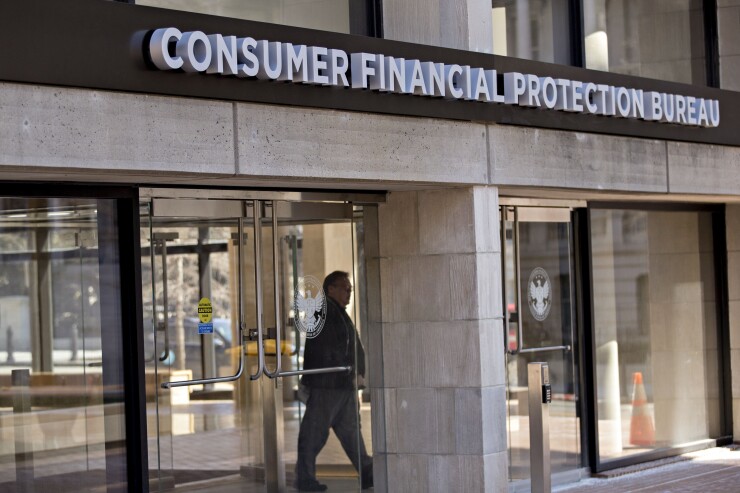The Consumer Financial Protection Bureau on Tuesday released performance metrics from a fintech that provides some support for using alternative credit data for underbanked consumers.
The agency shared results from the Upstart Network, which has participated in a CFPB program that tests promising digital platforms. The startup reported to the bureau that since late 2017 it has approved nearly 30% more loans using alternative data.
“The results provided show that the tested model significantly expands access to credit compared to the traditional model,” the agency said in a blog. It was co-written by Paul Watkins, director of the CFPB’s Office of Innovation, and Patrice Ficklin, the CFPB’s assistant director of fair lending and equal opportunity.
The San Carlos, Calif., fintech firm is the first and only company to receive a "no-action" letter from the CFPB. The program promises companies a lighter regulatory touch as they test models and report back on their progress.
Upstart Network claimed it was able to lower the annual percentage rate on approved loans by 16% using alternative data compared to a traditional credit model.

Lenders have
But a key issue is whether the use of alternative data in underwriting addresses compliance risks and avoids fair-lending violations.
The CFPB blog said Upstart Network's expanded loan volume and pricing reductions using alternative data benefited multiple demographic groups.
“This reported expansion of credit access reflected in the results provided occurs across all tested race, ethnicity, and sex segments resulting in the tested model increasing acceptance rates by 23-29% and decreasing average APRs by 15-17%,” Watkins and Ficklin wrote.
The company agreed to allow the CFPB to share key highlights from its testing.
“The concept of AI and alternative data in lending is enormously important and they want to inform people of what progress has been made on that front,” Dave Girouard, Upstart's CEO and a co-founder, said in an interview. "It’s certainly an advantage to us that we are the only company testing for data.”
The blog stated that Upstart’s results found “no disparities that require further fair lending analysis,” for minorities, women and applicants 62 or older.
Yet the blog included some caveats.
"Effective compliance management, as well as fair lending analysis results, may vary depending on a number of factors including the applicant pool and the lender’s specific use of data and models," the blog post stated.
Upstart found that consumers with FICO scores between 620 and 660 — which the firm called “near prime” — were approved twice as frequently using alternative data compared to a traditional credit model.
The company also found that applicants under age 25 were 32% more likely to be approved using alternative data while consumers with incomes below $50,000 were 13% more likely to be approved compared to a traditional model.
The CFPB has proposed
But state attorneys general and consumer advocates have asked the CFPB to rescind its no-action letter and product sandbox proposals and reissue them as formal rulemakings subject to a notice and comment period. The CFPB made no formal announcement of its fintech sandbox but circulated a draft proposal that was published in the
The blog also summarized some of the comments the CFPB received from a request for information issued in 2018 on alternative data and modeling techniques.
The CFPB has estimated that 26 million consumers are "credit invisible," meaning they have no credit history with a consumer reporting agency. Another 19 million have a credit history that has "gone stale," or is insufficient to produce a credit score, the CFPB stated. Without a sufficient credit history, consumers typically pay more or are denied credit.





